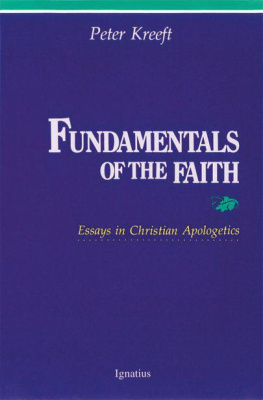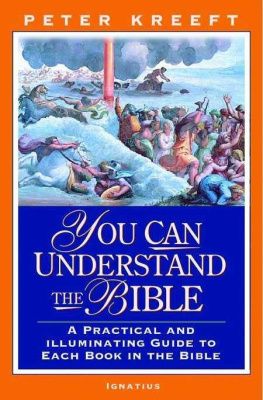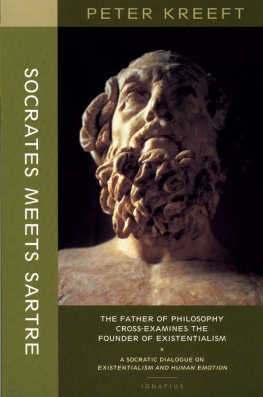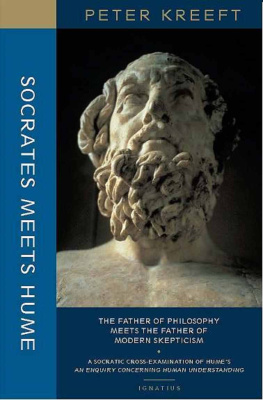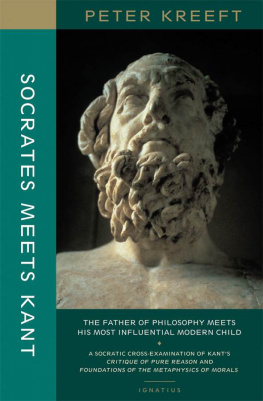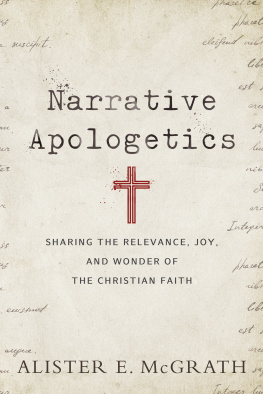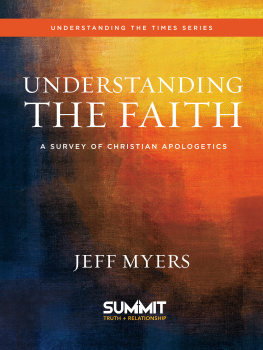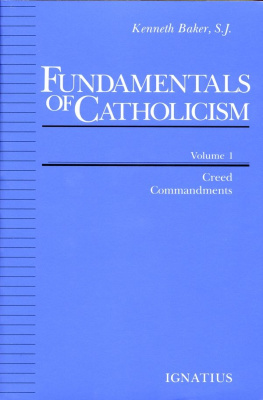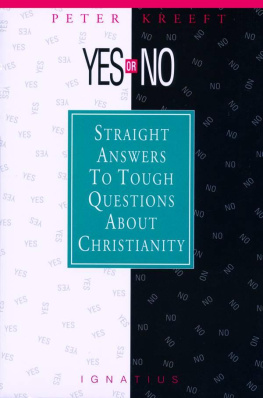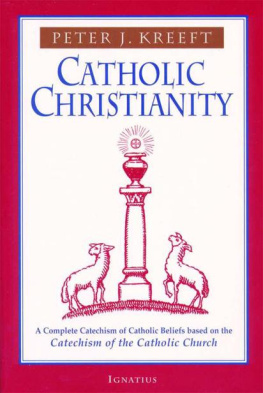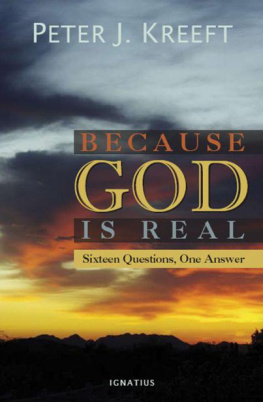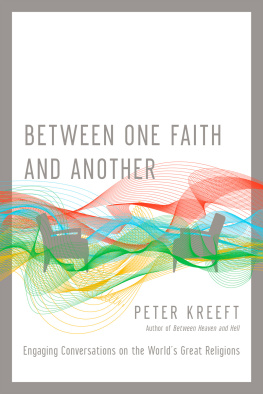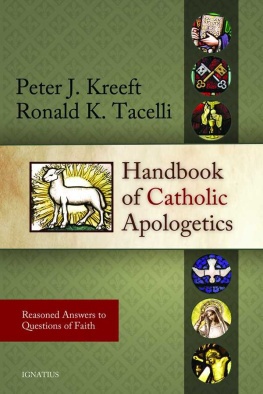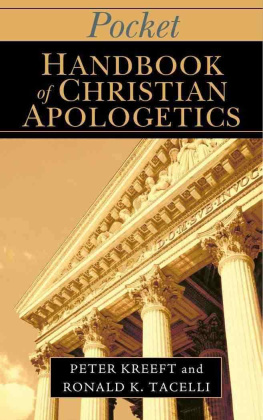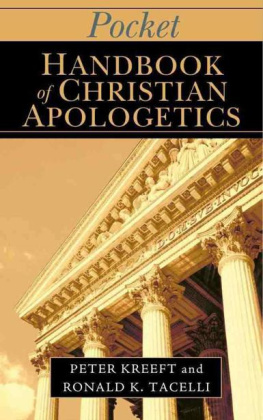FUNDAMENTALS OF THE FAITH
Essays in Christian Apologetics
PETER KREEFT
FUNDAMENTALS OF THE FAITH
Essays in Christian Apologetics
IGNATIUS PRESS SAN FRANCISCO
Cover by Riz Boncan Marsella
With ecclesiastical approval
(The granting of the Imprimatur does not imply
the acceptance of the theological opinions of the author.)
1988 Ignatius Press, San Francisco
All rights reserved
ISBN 978-0-89870-202-6
Library of Congress catalogue number 88-81277
Printed in the United States of America
Contents
I
CREED: FUNDAMENTALS OF CHRISTIAN BELIEF
A. Fundamentals of Christian Apologetics
1. Whats the Reason for Giving
Reasons for Faith?
B. Fundamentals of Christian Theology
II
CODE: FUNDAMENTALS OF CHRISTIAN LIVING
A. Christian Virtues:
The Three Theological Virtues
B. Fundamentals of Christian Spirituality:
The Lords Prayer
III
CULT: FUNDAMENTALS OF CHRISTIAN COMMUNITY
A. The Church
B. The Churches: Protestant and Catholic
Introduction
This book of bite-sized (or morning-coffee-cup-sized) little essays is not put forth as a complete theological system but as reconnoiterings, forays into key areas of the battlefield in the greatest war ever fought, the war for the minds and souls of human beings, the images of God. They do not intend to be bold, original, creative, groundbreaking landmarks or anything of that kind, but only clear and to-the-point restatements of the ancient and orthodox Faith of the Christian Church. The minds of very many young Christians today have never heard about this Faith, though they think they have. Because their teachers have made Esaus exchange, sold their birthright for a mess of pottage, this old stuff will doubtless appear as radically new and original to many readers. Those are precisely the ones I hope to reach, on both sides of the battlefield: both believers (to arm them with some weapons of the mind) and unbelievers (to engage in a loving duel with them). As Abraham Lincoln said, the only way truly to defeat your enemy is to make him your friend.
Each of these essays except the last is a revision or enlargement of an article that appeared in the National Catholic Register . They were written for Catholics by a Catholic. But I believe that nearly everything I say in the first two-thirds of the book will be found by the orthodox Protestant reader to express his faith as well: that solid and substantial core of faith that C. S. Lewis called mere Christianity.
Like every religion, this faith has three aspects, corresponding to the three parts of the soul and filling the innate needs of all three parts. First, every religion has some beliefs , whether expressed in creeds or not, something for the intellect to know. Second, every religion has some duty or deed, some practice or program, some moral or ethical code, something for the will to choose. Finally, every religion has some liturgy , some worship, some church, something for the body and the concrete imagination and the aesthetic sense to work at. Creed, code, and cultwords, works, and worshipare useful in outlining any religious faith, including the Catholic Faith of Christians.
Within the first division, creed, we can distinguish those things that can be known by human reason unaided by divine revelation (Aquinas called these the preambles to faith) and those things that can be known only because God has revealed them to us. Roughly, but not exactly, these correspond to (1) apologetics and natural theology and (2) creeds and revealed theology.
Within the second division, code, we can distinguish religious virtues and religious life, or spirituality. It is not an exact division, but it corresponds roughly to the three theological virtues on the one hand and the Lords Prayer on the other (which, as Aquinas pointed out, contains everything we need to know about how to pray, how to commune and communicate with God, i.e., the spiritual life).
Finally, within the third division, cult, we distinguish the four essential marks of the Church and the differences between Protestant and Catholic churches.
PART ONE
CREED: FUNDAMENTALS OF CHRISTIAN BELIEF
A. FUNDAMENTALS OF CHRISTIAN APOLOGETICS
Whats the Reason for Giving Reasons for Faith?
Apologetic about apologeticsthat seems to be the prevailing attitude of many professors, priests, ministers, and theologians today. Seldom in the history of Christendom has the very enterprise of apologetics been under attack as it is today. Why?
Apologetics is essentially the enterprise of trying to win men and women for Christ by obeying Scriptures own command to be ready to give a reason for the hope that is in you (1 Pet 3:15). Yet the experts in religious education sometimes attack this traditional (their code word: outdated) concept more readily than they attack the errors of unbelief. We are living through the incredible situation of teachers in the Church not attacking the errors of the world but attacking the truths of the faith, and attacking the very idea of attacking the errors of the worldas if the only error were the belief that there are errors, and as if the only idea to be refuted were the idea that some ideas are to be refuted.
This is largely the attitude of most of the religious Left, who dont do apologetics because they are too busy giving the Faith away to defend the little they have left. But many of the religious Right, or conservatives, also do not do apologetics anymore, or no longer do it effectively, because many conservatives belong to one or more of three groups. First, there are those who do not argue because they fear that human reason is a Leftist tool, something invented in pagan Athens, or in pagan Bostonthe Athens of Americaprobably at Harvard. These people are far more prevalent among Protestant fundamentalists than among Catholics. Second, there are those who argue, but for a narrow political agenda. They glue the Faith as tightly to capitalism, militarism, anticommunism, and Americanism as the Left glues it to socialism, pacifism, and anti-Americanism. Thus they buy into the very politicization of the Faith that is the root error of their opponents. Third, there are the pre-Vatican II nostalgia buffs among Catholics and high Anglicans, who secretly hope the whole Council was an elaborate plot of the media that never really happened. These people argue, all right, but they often argue so arrogantly and joylessly that they win no one over, or else so abstractly and scholastic ally that only a philosopher would be interested.
On the other side of the fence, its hard to find unbelievers who are willing to argue their case today either. Most ignore rather than try to refute the Faith. Most unbelievers today are relativists, and if you dont believe in objective truth, you wont believe in arguing, except as exercise, like jogging. It wont get you anywhere. Thats why you have probably never once in your life heard a real, genuine debate here in freedom-of-thought-loving and freedom-of-speech-loving America. The only thing a debate can be to a relativist is a Ping-Pong match of IQs, or a wild goose chase without the goose of truth.
But when we turn from the teachers to the students, from the small and arrogant oligarchy of opinion molders and experts who tell us what we really want, to the ordinary person in the pew, at the desk, or on the street, we find no less interest and no less hunger for reasons today than ever; for the human mind was designed by God, not by John Dewey or Carl Rogers. Jesus the Warm Fuzzy just doesnt have the appeal of Jesus the Eternal Logos. When advertising hype sells mountains of pablum, pablum does not thereby become steak, and people still hunger for strong meat.
Apologetics is necessary in any age (1) because it is commanded in Scripture and (2) because of the needs of the unchanging human heart. People still want reasons because they still have heads. It is as simple as that. Especially young people need apologetics today, to defend their minds and their faith against the subtle and incessant propaganda with which a secular environment, especially the media establishment, barrages them.
Next page
